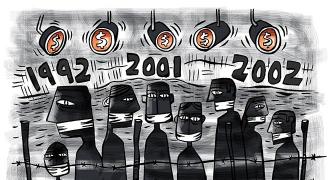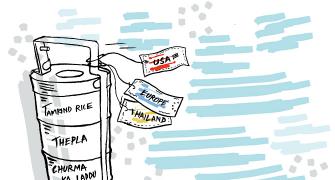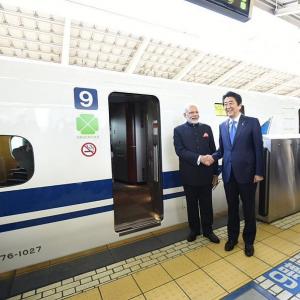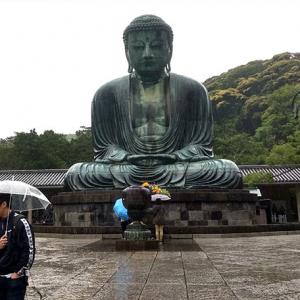'We have had 27 years of liberalisation and in the same period Korea and Japan and China transformed themselves forever,' says Aakar Patel.
I am writing this from Japan and Korea, both ancient Asian cultures like ours and it gives one the opportunity to compare them with us.
Today Korea has a per capita income of six times that of India's and Japan has a per capita income which is seven times that of India's.
As many readers will know, the difference between us and them was not that great a few decades ago.
Seoul, the capital of South Korea, got its first elevator in a building in 1968. Mumbai had elevators for many years before that.
The Jongno area in Seoul was where their industrial growth began, with small machine tooling shops that still exist.
In the 1980s they took off and followed the classic path to becoming a developed economy. They first did light manufacturing and textiles, which are high-employment but low margin businesses.
When I joined my family's polyester yarn business in Surat, the imports were often from Korea.
Then they got into heavy industries, and finally they got into the highest end of electronics.
Today Samsung makes the screens that even Apple products use. Traditional and small Korean companies became global giants in this period.
The company Lucky Goldstar, which made television sets, renamed itself LG and today is a brand recognised around the world along with Hyundai and other Korean firms.
Japan followed the same path slightly earlier. It has already the capacity to make large warships and advanced aeroplanes about 90 years ago.
After its defeat in 1945 following the use of atom bombs by American president Harry S Truman, the Japanese decided to give up their militarism and focus on their economy.
They originally made cheap cars which were copies and were laughed at in the West. Today the number one and number two best selling four door cars in the United States are Toyota and Honda.
Japanese-made guitars and pianos, once very cheaply made, are today the best in the world.
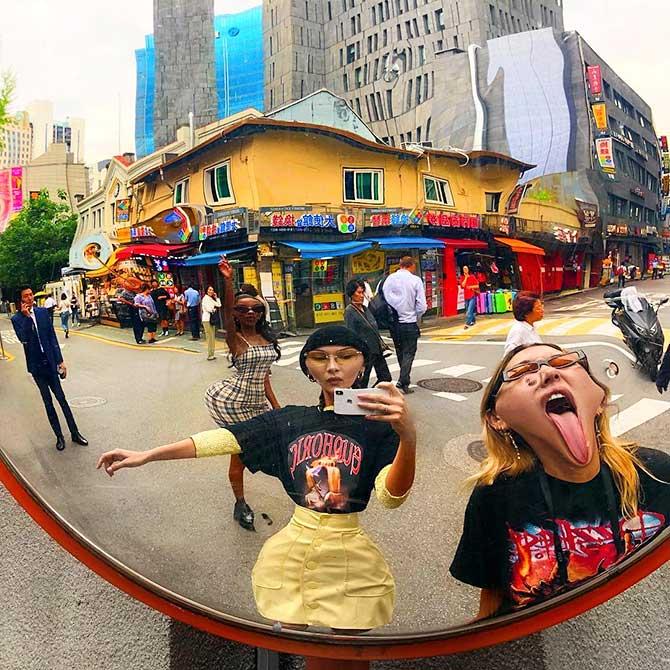
Like India and Pakistan, Korea and Japan hated each other. Japan occupied Korea for many years till 1945.
Japanese soldiers abused tens of thousands of Korean women (many who are still alive) in this period.
Korea itself is partitioned like India into two countries, which have a dangerous border and the threat of nuclear weapons, just like ours.
But South Korea and China (which was also occupied by Japan around the same period) made peace with Japan. Today the majority of tourists in Japan are Chinese and Korean.
The differences exist, but they have been set aside to ensure the economic progress of their populations.
The other interesting thing is how they did it. Both Japan and Korea leaned on their own culture. Almost nobody speaks English in Japan but that does not stop it from being modern.
Their effort at improving themselves through their own culture is by focusing on the internal positives. The Japanese way of manufacturing and quality control is today borrowed by the Western world.
They have changed their nationalism, and turned away from hating their neighbours and their minorities. Large numbers of Koreans live in Tokyo today and Osaka today.
Both had a limited engagement with the West and were occupied by America for a few years after 1945. We were occupied by the British for much longer.
The Koreans and the Japanese learned from this engagement and used it to improve themselves by refining their own culture. Their elites don't speak English. Their nationalism has not focused on hating and harming their minorities.
We should examine our history and see what we did differently to land up in the space we have compared to our Asian neighbours.
Korea has become a big economic power only in the last 30 years. India's prime minster blames Nehru, who died in 1964. We have had 27 years of liberalisation and in the same period Korea and Japan and China transformed themselves forever.
How much of our nationalism is focused on refining our culture?
To answer that, ask yourself how often our nationalist party talks about Indian music and literature and Indian architecture and art and what is done to use it to improve our lives.
India's nationalism has focused on its religious minorities. This has produced two results.
The first is that it produces continuous internal strife of high order. The results are in the media daily.
Second that it doesn't address the primary challenge of engaging with modernity through our own culture.
It is negative and not positive. It seeks to disrupt the lives of Indian citizens and not improve them.
This is why we remain where we are, despite having as rich a history and culture as all of those Asian nations that have succeeded in delivering a better and more prosperous life for their citizens.
Aakar Patel -- winner of the 2018 Prem Bhatia Award for Political Reporting -- is Executive Director, Amnesty International India. The views expressed here are his own.
- You can read Aakar's earlier columns here.

